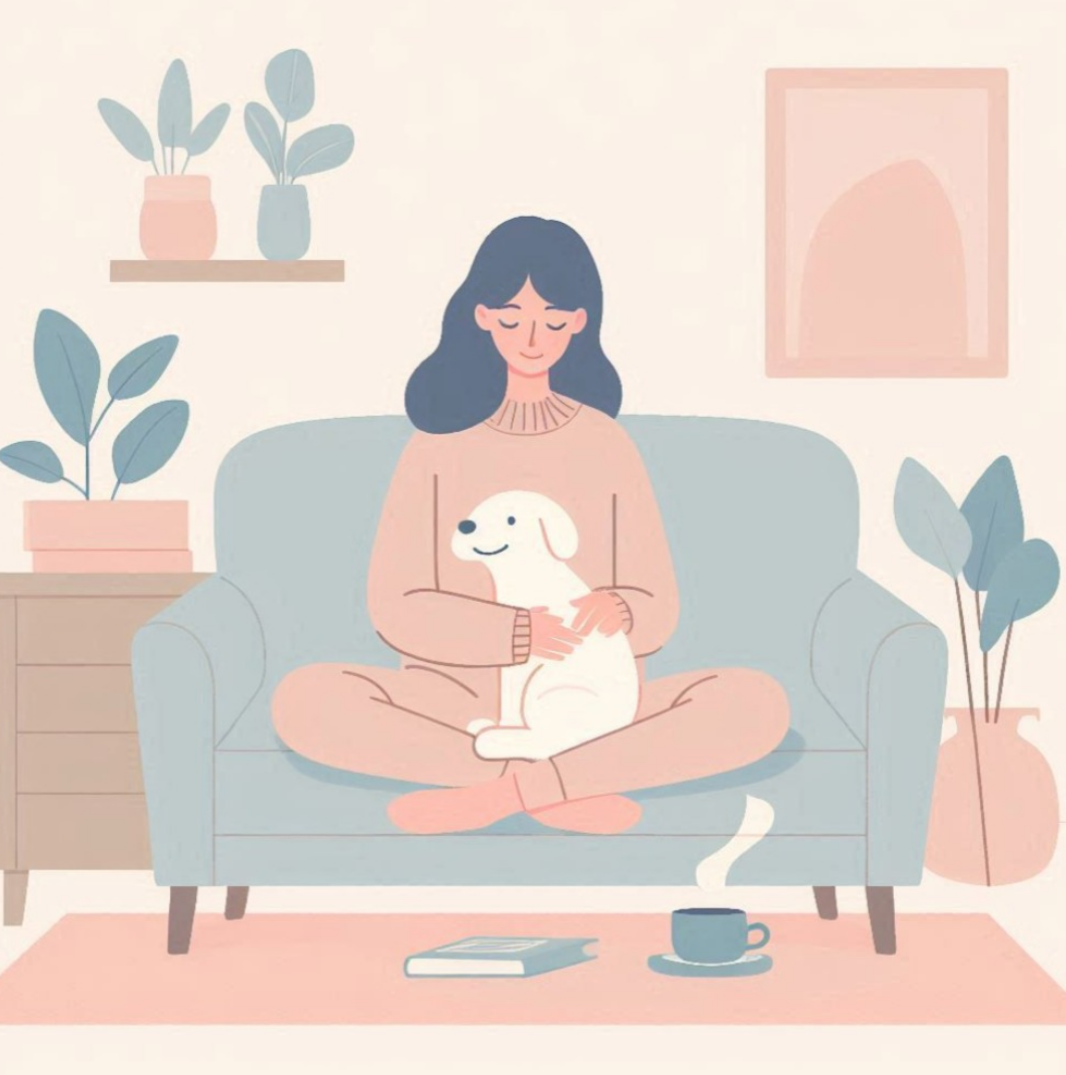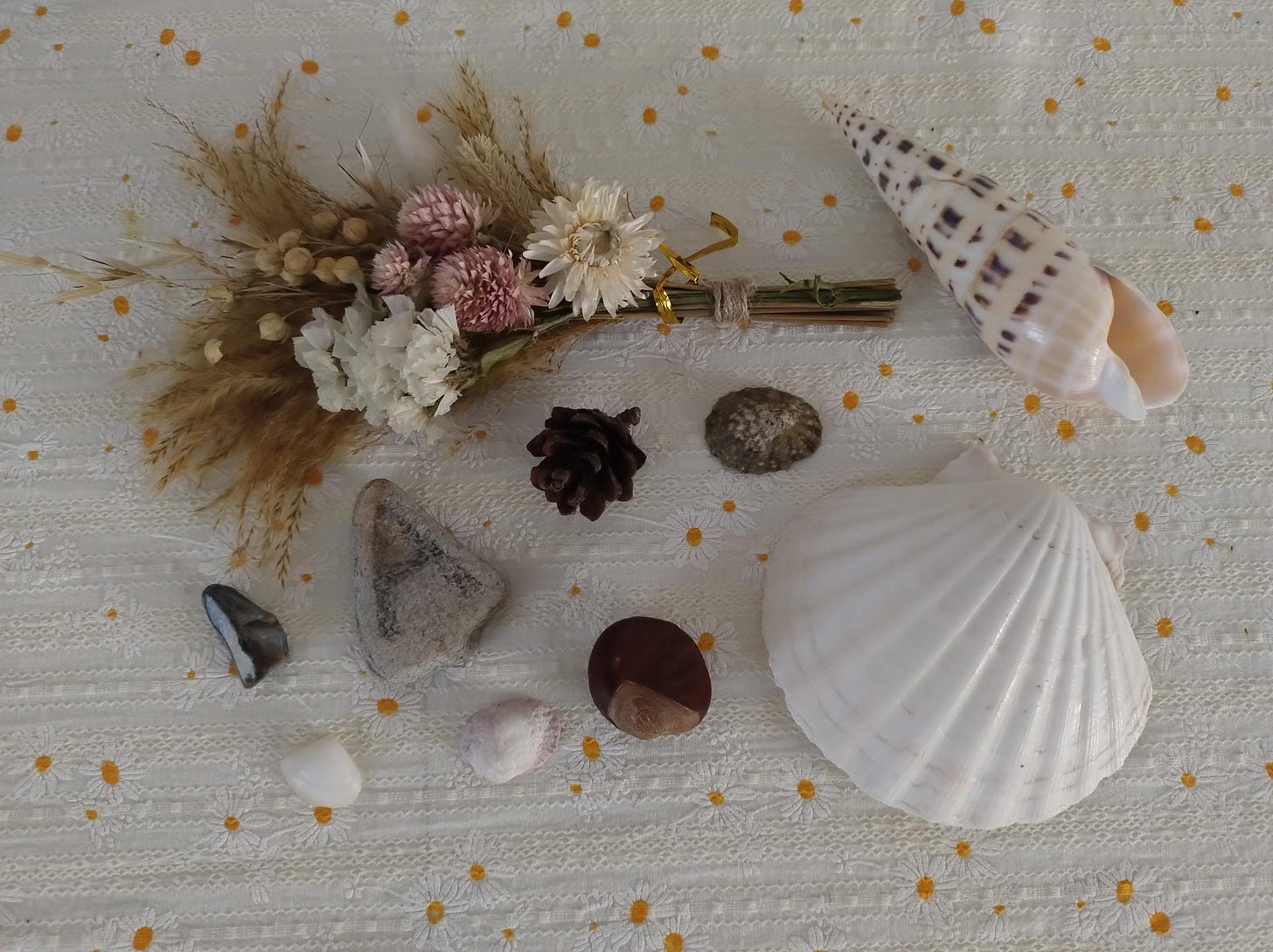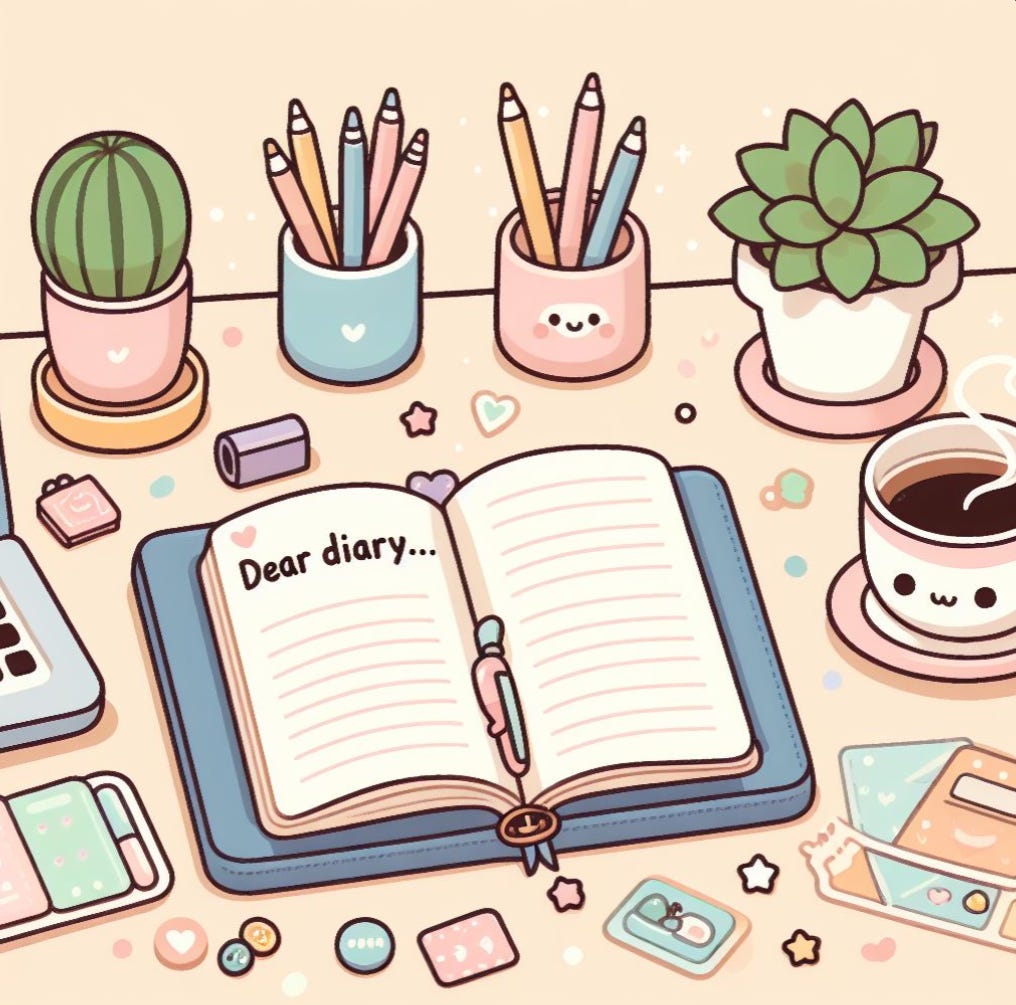#13 Is comfort having a crisis, or are we?
Is stepping outside of our comfort zone always the best option? When it comes to having a chronic illness, sometimes seeking comfort is the best way forward...
I keep hearing people say that there is a ‘comfort crisis’ going on, but what do they mean by this exactly? Michael Easter talks about this in his new book ‘The Comfort Crisis: Embrace discomfort to reclaim your wild, happy, healthier self’. He says we’re all getting a bit too reliant on the day-to-day comforts of modern society, like technology, air-con, fast foods, elevators, and that we’re not pushing ourselves enough to do hard things, that we’re too sheltered from life’s inconveniences, that were not letting ourselves sit with our own thoughts enough, and all this is making us become more unhealthy and unhappy. Whilst he does raise some interesting and valid points in his book, like how we should all spend more time out in nature to improve our wellbeing and to stop doom scrolling on instagram, there was something about the book that left me with a sense of unease. I kept thinking, ‘ok this is all well and good… if you are a healthy, able-bodied person’. I felt like it didn’t quite apply to people who are neurodivergent or have a chronic illness or disability. Surely life is inconvenient enough for this group of people already, do we really need to keep ‘pushing ourselves outside of our comfort zones’, when our bodies (and society) are doing a pretty good job of that on a daily basis anyway? His suggestions sounded great for people before they got sick, a preventative method, but what about the people, like us, who are already sick?
After reading the book I was left feeling quite guilty, lazy and like I wasn’t trying hard enough. But then I pondered on it for a while. (You see, people who are stuck at home being sick, already have a lot of time to sit with their own thoughts, too much time in fact, to the point where we often drive ourselves a little loopy. Anyway, I digress). I then remembered what got me to this point in my life of absolute burnout in the first place. The fact that for years I kept pushing through my symptoms of illness, that I was ignoring what my body and mind were desperately trying to tell me, and that instead I needed to slow down and take care of myself. Now I get what he's trying to say, but a lot of what he said I just couldn't apply to my own life right now. Even the seemingly simple act of ‘do more exercise’ is a challenge if you have an autoimmune disease. Pushing yourself too hard out of your comfort zone could actually make you sicker. For example, with Ankylosing spondylitis (and many other chronic illnesses) it often comes hand in hand with extreme fatigue. Some exercise helps, but too much can cause crashes or flare-ups of your illness. For example, more joint/muscle pains, weakness, dizziness, infections etc. So going out for 10 mile nature hikes with a big weighty rucksack on your back to build up strength (his suggestion), isn’t always an option.
Before we start pointing fingers at people who are taking the elevator or using technology, remember that some of us need to do these things to survive. We may need to take the elevator or park really close to the store entrance because we have bad knees or chronic fatigue. We may need to wear headphones on the bus and look ‘antisocial’ because it's too overstimulating listening to all the chatter and noises. Things aren’t always so straight forward.
What is comfort?
So, I guess it all depends on how you view comfort, and how you define it in the first place. So, I started to ask my friends and family what comfort meant to them. What were their particular go-to comforts? I also thought about my own comforts. What do I immediately think of when I try and comfort myself?
Below is a list of some of the things we came up with:
The smell of freshly ground coffee in the morning
Wearing cute slipper socks
The sound of rain when you’re tucked up in bed
Watching re-runs of your favourite TV show
Eating a roast dinner your nan made you
Getting into fresh bed sheets
The crunch of fresh snow underfoot
The smell of a new book
Someone brushing or playing with your hair
Writing in a new notebook
Literally everything about autumn
Hearing the birds tweeting at dawn
Petting a dogs soft fur
The smell of lavender
Drinking out of your favourite mug
The feel of warm sand between your toes
Singing along to your favourite song in the car
Watching a crackling fire in the wintertime
A big bear hug from a loved one
I thought these all sounded so lovely and comforting. They gave me that fizzy nostalgia feeling in my stomach just thinking about them. I didn’t think any of these were overindulgent or would make anyone fall into the pit of laziness and despair! They all sounded like cheap, simple and fun ways of making every day life more joyous. What’s wrong with that hey?
What are some of your comforts? I would love to hear some in the comments below!
I also spoke with my therapist about this topic in my latest session. How do I know when to push myself and when I need to take a step back? When do I need to push myself outside of my comfort zone, and when do I need to actively seek out comfort? She said of course everything in life needs a balance of the two, but right now, so soon after diagnosis, we need to get your baseline to a more steady state before you go and start pushing yourself too hard again. That I needed to calm my nervous system, reduce my stress levels and inflammation in my body first. Right now my body is in a pretty constant state of fight or flight mode. Due to factors such as systemic inflammation, immunity dysregulation, stress, anxiety, depression, chronic pain, to name just a few.
When all these things are more stable, it's easier for me to know what my body needs. So over the next few weeks/months my therapist is going to help me develop a ‘toolbox’ to help me establish a more steady baseline. Bring me back to a somewhat ‘normal’ state (as much as one can be with an autoimmune disease). Many of the things that she mentioned, that would make up a toolbox, we're already a lot like the comforts I mentioned above. Other examples were doing simple creative, hands on tasks like knitting or colouring. She also mentioned doing guided visual and audio meditations on YouTube.
Sensory toolbox
It made me realise that there was a strong sensory link to the comforts. They were filled with sights, sounds, things you can touch, smell. My therapist said this was a good way of grounding oneself. Coming back to our bodies. A way of connecting to the present moment again. It not only helps with anxiety and depression, but also with chronic pain and inflammation. A way to help retrain the brain to focus on different things other than just the uncomfortable sensations in the body. She said even simple things like smelling citrus can help ‘trick’ our brains and make us feel more alert. It may only last a little while, but if you do this often enough throughout the day with a range of different ‘tools’, then it could really start to make a difference.
I noticed that I’ve naturally started to do this in many subtle ways already. One example is that each time I go on a nature walk, I stop and take a short video. This way, when I’m next stuck in bed with fatigue and can’t go outside, I can look back at the videos and still get my sensory hit of nature. A way of calming myself and distracting me from pain. When I watch the videos I can hear the birds, the rustle of the leaves in the wind, I can see the dappled sunshine coming through the tree canopy. I can imagine that I’m there.
I often take a little trinket from my walks too; a pebble, a leaf, a conker, acorn. I put them in a little dish on my desk and just roll them around in my hands when I feel a little anxious. It sounds silly, but feeling these trinkets in my hands really helps. They are all becoming a part of my sensory toolbox. [I guess it’s why those TENS machines really work, they literally distract the brain by giving you tiny electric currents that stimulate nerves and block pain signals]'.
I’ve included some of my little videos below, maybe they will help to comfort you too? (Sound on for full effect; piglets munching, waves lapping, birds tweeting, rain falling on leaves). Really allow yourself the time to sit and soak up all the different sights and sounds. Can you imagine what the sun feels like on your skin? The feel of the cold rain drops on your face? The smell of the salty ocean. The fresh smell of the pine trees in the forest. The feel of the piglets coarse fur under your fingertips. Ahh it’s making me feel better already…
Summary
Now I’m not saying any of these things can magically make us feel better overnight or that we should never do hard things ever again. But by incorporating some simple comforts into our lives, by building up a toolbox of them, they can actually help us manage our illness. A way of helping us cope with the extreme ups and downs of living with a chronic illness. Helping us establish a steadier baseline, so when we do have to push ourselves and life throws us a curve ball (because it will, that’s life), we are better able to stay grounded.
I’ve started to look at my environment and surroundings in a whole new way. For instance, how can I adapt my home to make it a more comfy and restful place to be? How can I make it a sensory haven? What I've noticed with this disease is that it's not just one thing we do that makes us feel better, it's many tiny things, a whole lifestyle change. All these little things we do build up overtime and ultimately help us to lower our stress and therefore inflammation/pain.
I will always remember when I was training to be a Nurse, I had a placement on the dementia unit at a care home. They had a lovely sensory room filled with different toys, gadgets, trinkets, different lights and smells and comfy seating areas. A lot of the residents would sit for hours in that room. Even the people who had sadly forgotten how to eat, how to talk, how to dress themselves, they always remembered what comfort felt like and would actively seek it out. I feel it's an incredibly primal feeling that we can all tap in to. Our nervous systems remember it, they crave it. Why deny ourselves these simple comforts? Especially at a time in society where things can often feel quite overwhelming, especially for us folk with a chronic illness. Life may never be easy for us, but we can implement things to help us cope with life’s ebbs and flows.
How about you?
What are some of your comforts? Are they quite sensory too? Do you feel guilty when you allow yourself these small comforts or do you let yourself enjoy them? What could you put in your sensory toolbox? I would love to know in the comments. (And get some ideas too).
Thanks again for stopping by and taking the time to read my blog. I would just like to say a big hello to all the new subscribers who have signed up recently! Thank you, it really means a lot. I would also like to say a big thank you to all the subscribers who have stuck with me from the start. It’s been such a fun few months and I’m glad you’re all here. If there are any topics in particular you would like me to cover or delve into, please let me know either in the comments or feel free to drop me a private chat message. Thanks :)
Sending you all healing thoughts. See you next week.
Lots of love & hugs,
Amanda x
P.S Find below my little diary snippet for this week. Enjoy!
Sunday 21st July 2024
Life with a chronic illness is strange. One day you’re laying in bed sobbing with pain wondering when it will end, the next you’re out enjoying a nice walk, no pain, not a care in the world. I don’t think I will ever get my head around this, trying to get used to the ebbs and flows of living with a dynamic disability. I’m slowly learning with time though how to ride these never ending waves. I’m trying to slow down my pace of life to make it easier to do this. Slow my schedule down, slow my racing thoughts down, just slowing it all down. I’ve noticed that when I slow down I notice things more. More beauty and the little miracles of everyday life. For instance, I must have walked past this wall thousands of times. It sits just to the left of my front door. Yet I have never noticed this pretty little trailing plant growing out of the cracks before. I stopped and looked closer, taking in all its features. I noticed the delicate lilac and yellow flowers that look like teeny snapdragons. How sweet, I thought. I took a picture and looked up the name of it, it’s called ‘cymbalaria muralis’ or Kenilworth Ivy or Ivy-leafed toadflax. How much have I been missing out on all these years of rushing and pushing through? My husband and I went out food shopping today at our local Tesco. We noticed how busy it was, even on a Sunday. Every one was rushing and bumping into each other’s trolleys, eye rolling and tutting under their breaths at any slight inconvenience another person caused them. Did Sundays always feel like this? We both said to ourselves, life just feels like one continuous rush hour now. Everyone is just too busy. We couldn’t wait to get back to our home and sanctuary and tune out the outside world again. We brought in the shopping from our car and I smiled as I walked past the wall with my new little flower friend on it. A reminder to slow down so we can notice the little things in life. Each tiny flower, each little miracle at a time…








All great ideas. I hang a string of lights in my bedroom. It always makes me feel settled and cozy, especially in winter. I bought a really cool floor lamp at a consignment shop. I use that when I need some extra comfort.
If I'm really fatigued, I choose a few floor yoga poses and just hold them for several minutes, rather than doing a full yoga sequence. If my body wants to melt into the floor, I facilitate that and it does help.
hi i just want to know if the writer of the book has suffered mentally or physically as I truly believe you have to live the life to know what it is really like. You can imagine it for ten minutes but, in reality, if you have a chronic illness, it can get you down as it has no timetable you can adhere to. If there was a timetable, then you could look forward to the 'good' times but if there is no timetable, then you have to comfort yourself, whenever you can cos it'ss about surviving mentally and physically.
Be kind to yourself, you deserve it. I think you have to try and take the word 'pain' out of your head as just the word makes me wince. And I think you should swear a lot as it helps relieve the pressure !!! I believe you have to try and trick the brain again. Apparently the best thing to help insomnia is to say to yourself 'I will not allow you to go to sleep' then you do. It's the old adage "Don't look now, but ...." so it is reverse psychology.
I would always have a nice treat like a 'naughty' chocolate to eat or something like lavender cream waiting for me if i wake up in the middle of the night and say to myself 'yippee' you have woken me up i am so happy as i can have a Malibu and coke and watch a TV programme and cuddle up with my hot water bottle. The brain is then thinking 'hold on - you are supposed to be sad - then you re-boot it into thinking its a treat !
The middle of the night when everyone else is asleep is the loneliest time of all cos you can feel like you are the only person alive and awake on the planet so i would turn on a programme from the States then i'm in a good time zone.
A lot of my good loving happy thoughts go back to childhood when i was living abroad as a child. So, whenever i see a bright orange canna with variegated leaves, i go straight back to a happy place and the sound of crickets makes me feel I'm home - in my heart and in my being loved and protected brain.
The same goes for African Marigolds - i used to delight in squeezing the flower head and loved its unique smell!!
The sound and smell and warmth of a lawn mower cutting grass.
Walking with bare feet on the grass, even if it's wet.
Smell of boiled chicken broth with pearl barley reminds me of being loved and wanted and that life is all good.
Picking a bunch of wild flowers and knowing the name of each one and thinking how clever as 'shepherd's purse' is really like a purse for a shepherd and putting my finger into a foxglove to see if it would fit ""
Taking out the pistil from honeysuckle and tasing it.
Smell of a real charcoal bar-b-cue
Crackling and spitting of an open fire
songs from my childhood
Piano playing the classical pieces my mother used to play
I think sometimes, when you are ready, you can step outside of your comfort zone is a good thing as it gets the adrenaline flowing and that might revitalise the brain and its about conquering the fear which gives you a feel good factor but certainly not to do it all the time and you have to be in control - because you WANT to do it, not because you feel you SHOULD.
There's a fine line between feeling sorry for yourself and surviving but you do have to be kind to yourself. I remember in Eastenders, he said "I want to wallow in my misery" as England had not won the Football match but a day later, the brain wasn't in such a bad place as it had 'accepted' what had happened. Don't be too tough on yourself, as life is difficult enough as it is .
I love the poem called 'Desiderata' as it has many wise sayings in it.
.
Desiderata - Words for Life
Go placidly amid the noise and haste,
and remember what peace there may be in silence.
As far as possible without surrender
be on good terms with all persons.
Speak your truth quietly and clearly;
and listen to others,
even the dull and the ignorant;
they too have their story.
Avoid loud and aggressive persons,
they are vexations to the spirit.
If you compare yourself with others,
you may become vain and bitter;
for always there will be greater and lesser persons than yourself.
Enjoy your achievements as well as your plans.
Keep interested in your own career, however humble;
it is a real possession in the changing fortunes of time.
Exercise caution in your business affairs;
for the world is full of trickery.
But let this not blind you to what virtue there is;
many persons strive for high ideals;
and everywhere life is full of heroism.
Be yourself.
Especially, do not feign affection.
Neither be cynical about love;
for in the face of all aridity and disenchantment
it is as perennial as the grass.
Take kindly the counsel of the years,
gracefully surrendering the things of youth.
Nurture strength of spirit to shield you in sudden misfortune.
But do not distress yourself with dark imaginings.
Many fears are born of fatigue and loneliness.
Beyond a wholesome discipline,
be gentle with yourself.
You are a child of the universe,
no less than the trees and the stars;
you have a right to be here.
And whether or not it is clear to you,
no doubt the universe is unfolding as it should.
Therefore be at peace with God,
whatever you conceive Him to be,
and whatever your labors and aspirations,
in the noisy confusion of life keep peace with your soul.
With all its sham, drudgery, and broken dreams,
it is still a beautiful world.
Be cheerful.
Strive to be happy.
— Max Ehrmann, 1927